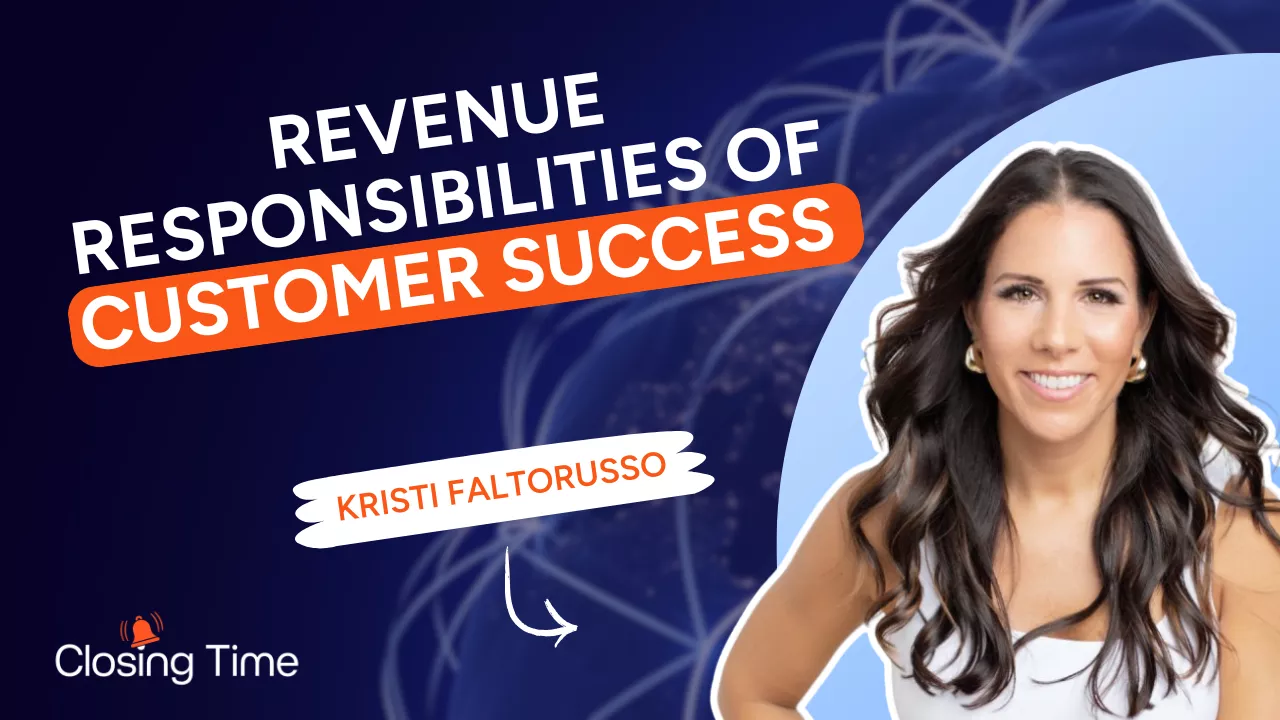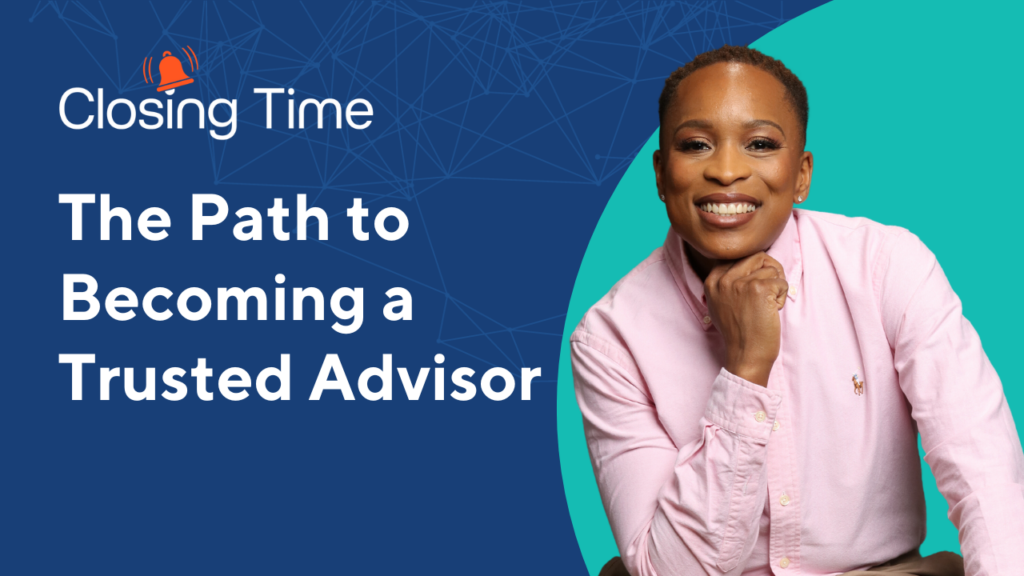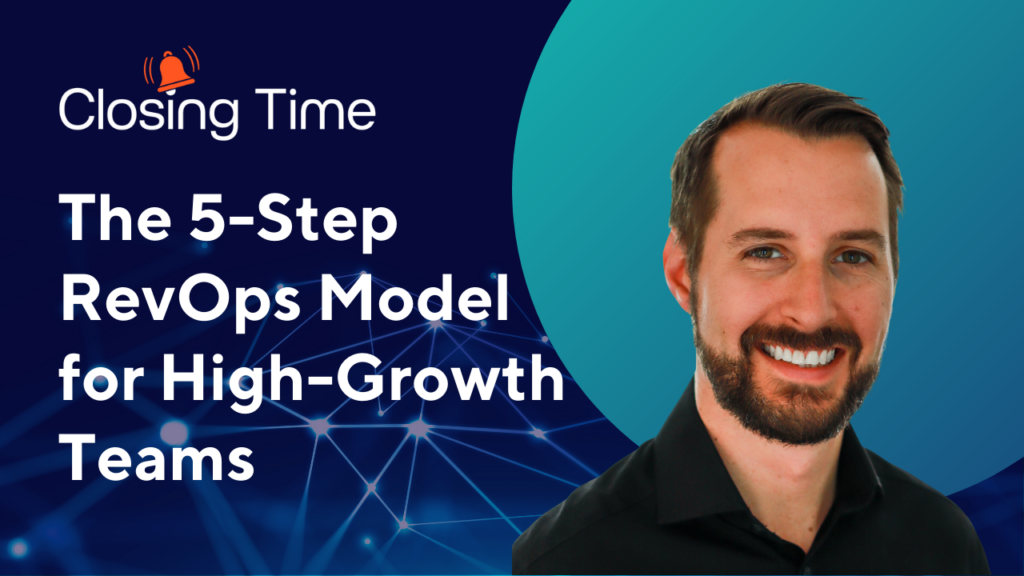Does customer success own a revenue number in your organization?
There’s lots of ways to approach this.
Let’s break them down in today’s episode of Closing Time.
Thanks for tuning in to Closing Time, the show for go to Market Leaders.
I’m Geoff Coutts, SVP of sales and customer operations for Unbounce
and Insightly.
Today I’m joined by Kristi Faltorusso,
chief customer officer at Client Success.
Thanks for joining us, Kristi. Thanks, Geoff.
I’m so excited for our conversation today. Yeah. Thank you.
We are too.
First of all, where are you joining us from?
What part of the world are you in today?
So I am in New York, but I am on Long Island.
So very specific.
I have to make sure that’s very clear, because I feel like anytime I say
New York, people think Manhattan and I’m definitely not close to the city.
That’s so true. Good clarification.
Thank you.
Well, it’s great to have you on the show.
Can you, maybe for people that aren’t as familiar with you or your organization,
tell us a little bit about client success and and your role in the company.
Absolutely.
So client success is the customer success management platform.
So we help customers manage from what we say from new to renew that entire post
initial sales lifecycle.
So everything from onboarding all the way through retention, expansion,
growth and advocacy.
I’m our chief customer officer.
So I’ve been with the company for actually it’ll be four years on Saturday.
And so I oversee everything in that post initial sales org.
So that’s success support and services for us.
That’s great.
Well, I’m looking forward to talking about about success.
It’s a really important function.
I know in our organization and in many, many companies.
Maybe to start with a little bit about the market conditions right now.
And I would say, you know,
it’s probably no surprise
there’s a little bit of uncertainty out there in the market.
Especially across North America right now.
And many organizations are thinking about what’s their best path
to create revenue growth and their challenge of,
I think a lot of companies with new logo growth.
So they’re turning to CS to say, is there an opportunity
for expanding our revenue and a more of a growth motion
and overemphasizing that versus new logo business?
what’s your view on that?. What are you seeing in the market today?
You know, it’s funny is that this is the same behaviors that we saw
several years ago.
As we were navigating the uncertainty during the pandemic.
And so this isn’t a new experience for the post sales team.
We definitely have faced this before.
And so, listen,. I think it’s an interesting,
you know, approach for all businesses.
It’s not something that should pop up when times are bad.
It should always be how you run your business. Right.
You bring customers in.
And the intention should always be to get them to stay and grow.
Now, how do you approach that and how you run that part of your business?
I think depends on a lot of variables, and I think we’ll get into that today.
But this is not an unfamiliar motion and should always have been part
of how we think about business revenue.. Yeah.
I think about our experiences and,
you know, the whole notion of land and then expand is a very common one.
And depending on the makeup
of your products in your organization, there may be more of an opportunity
to do that in some organizations versus others.
But I think, I would agree it’s a really important, function
as part of a growing, especially SaaS company.
So let me ask you this.
In general, revenue ownership by CS can be
a mixed bag based on a lot of different factors.
And frankly, it can be a little bit controversial.
Not everybody signs up for a role, A,
and B and is asked to do role B on top of that.
From a responsibility standpoint, sales and CS are often seen as quite different.
But in terms of your experience working with SaaS companies,
what does that look like in terms of revenue ownership?
So, you know, I don’t think that there is one way to approach this.
And I think what’s interesting is that so many people have gotten on these, like,
you get these little sound bites
that happen to perpetuate the different industries.
And so it was like,
yeah, CS has to own revenue and has to own renewals or expansion or growth.
And let me just tell you something I have been at for five different companies,
all five companies I’ve been to, we have managed revenue very differently.
In one, we didn’t own any revenue and some we owned renewals but not expansions
and some we owned renewals and expansions, but not cross-sell.
We own expansions and upsell like there’s so many variations of this.
And so I’m always going to give a big fat, “It depends,”
because there is no right or wrong way to do it.
You have to do the appropriate thing for your organization
and more importantly, your customers.
So when it comes down to it, I don’t I’m not opposed to owning a number.
And I think as a leader,. I need to be open to owning the number.
And in fact, a lot of them.
I did own a revenue number, but depending on what the motion needed to be,
who executed the motions in the operations behind it could vary.
That’s,. It’s an important way to look at it.
When I.
When I think back about the different roles that you or
I have had, it is it is quite different based on the makeup of the company.
But how do organizations, in your opinion, find that right structure?
Is it based on things like, well,
how big is the ACV, the contract value or the annual contract value?
Is it is it a segment issue between. SMB versus mid-market versus enterprise?
Is it the term or the contract?
What are the different variables that you see making up the
the the way that you can determine what that structure should look like.
So I think oftentimes the drivers there are much deeper than that.
Right?
So if you think about the level of complexity
of the products that you sell,. I often start there.
If you think about something that is, like an oracle or a if you think
about Adobe or Salesforce, right, you have a suite of products, right?
Which means any one customer could have five of your solutions,
and all five of those could have different buyers
with different budgets and different timelines.
And there’s so much complexity to how you might run
the commercial motions again, that
because of what your product is, right, how you sell your product.
So I think it’s important to first start with that.
Like what is it that you’re selling and what does the motion look like there.
Because if I’m a CSM and I’m managing a customer
and they have a product and we’re having them use it,
it’s gonna be very different motion.
If you tell me we’re going to run a cross sell play to a different team
in the organization that has a different budget, right.
The the activities and what I have to do is very different.
So I always say start with understanding what is the scope of what
the objective is like, what is it that we’re trying to push?
What are we selling?
Now, beyond that, I do think it’s important to consider the customer.
In my time,. I’ve worked with large enterprises.
So think like GE all the way down to small SMB, mom and pop shops.
And so yes, the motion there is very different, right?
When you’re working with a very large enterprise organization,
you’re going to have a very long time cycle.
Very it’s going to be procurement and legal and security reviews
on top of negotiations and understanding value adds and needs and all this stuff.
Whereas with a small transactional account, it’s going to be
just that very transactional and renewal can be done in a day.
So there are so many factors at play here.
And I think because every company and the market
and your customers is so unique, all of those variables
have to be considered to figure out what’s appropriate.
Yeah. That’s a that’s a really good perspective.
And I think matching the the product makeup as well as the size of company
are, are two really important factors that you called out there.
One of the things you mentioned a minute ago, is, is around renewals.
It might be a little bit tactical, but I think the first touchpoint
where this starts to really hit the road is who’s responsible for renewals.
Is it sales or CSM and and how would they work together.
What’s your view on on managing renewals.
Again, it’s like nobody loves my answers because my answer is always it depends
because of the complexity of it. Right.
I do think regardless of who owns the motion, customer success team,
I think at the end of the day
is accountable for it as the outcome because the renewal is going to happen.
If they delivered on the promise that was sold. Right.
And I think that that’s where the accountability lies.
But who runs it?
It could be a renewals manager.
It could be the CSM, it could be the new sales team.
It doesn’t really matter.
I think it’s again, trying to figure out what’s appropriate based on bandwidth.
And again, what is the motion look like.
So again a lot of considerations there.
But at the end of the day,
I do think that there is some accountability
that has to lie with the customer Success team.
And this is where, you know,
incentivizing the right behaviors,. I think is really appropriate.
So whether it’s having, you know, either
their OTE or a bonus or a spiff or something where you’re incentivizing it
from a revenue standpoint, making sure that that is the outcome that happens.
But again, from a who actually does the work,
I don’t know, I I’ve seen it slice and dice so many different ways
and I don’t know if there’s a right or wrong one. Yeah.
That’s good.
I’m just reflecting on my own organization here, and we decided that
the CSM would be ultimately responsible for all of the renewals.
And then there’s a, a collaborative motion between the CSM
and the growth AE to make sure we’re properly supporting every customer,
but also making sure that we are looking at opportunities
for upsell and cross-sell at the same time,
because it is an important inflection point.
Some organizations have a specific renewal
manager or renewal person who is responsible for only that.
Where do you see that fitting into the equation?
I mean, I think if your product, if it’s a very transactional process
and even the product that you sell, there’s not a lot of complexity there.
I think having a renewals manager there is fine, because again,
you’re not asking them to do any strategic work.
Usually it’s like it’s almost an assumptive close
where you just have somebody kind of going through the motions.
I almost feel like it’s a little bit of more of a junior role.
Whereas when I think about very strategic motions,
I think the collaboration with an account manager or a customer success manager,
whether it’s the AE, there is different conversations that need to be had.
There is a different there’s a different sales strategy. Right.
And the methodology
that you use to support that to ensure that the right outcome happens.
It’s just it’s very different.
Now I’ve, I’ve led teams with both.
And oftentimes what I find is just that right
when I have a renewals manager, it is somebody who can operate
a bit more independent from the other teams, doesn’t need that necessarily.
That collaboration and that strategy behind it.
It can be something that happens independent
of all the other work that’s happening alongside.
Okay. Got it.
Let’s. Let’s pull on that thread just a little bit.
When you mentioned, you know, some organizations, the
the solution is a bit more sophisticated than others.
Let’s, let’s take an example of a sophisticated organization.
And the CSM is involved and there’s a renewal.
How do you see their role in the expansion motion
on top of the renewal, if it’s a sophisticated solution that has
in your company, is a lot more to offer than what the customer is using today.
I mean, at the end of the day, your CSM should be very in tune with what
the customer’s pain points are and also what their goals and objectives
are, and not just for your product, but in general.
And so if we have clarity around that, we should actually be the ones
recommending
what the customer needs or should be using in order to achieve those goals.
So we should be leaning in very thoughtfully
and selling from that consultative lens of this is what the customer needs,
because this is what they’re trying to achieve.
So I don’t care who owns it.
Again, the operations part of it to me is always like, I don’t care.
But from a strategy standpoint, your CSM should be the most dialed in.
Now, I often find that there is a little resistance.
Obviously not everybody has, interest in selling,
but at the end of the day, you know what we do? We sell value, right?
We sell outcomes.
So even if you’re not doing the commercial activities, we are all sellers.
And so I do think that the CSM is have to play a very strategic role in that.
That’s great.
I you know, it
leads me to think just a little bit more about the skill set side of the equation.
So your comment that the CSM needs to understand the customer the best.
I completely agree with what what about the notion that,
you know, as a as a professional, somebody signed up for one of two
different career paths, a CSM is is really all about
bringing the most value to that customer and managing them and making sure
that they’re taking advantage of your solution, the sales executive.
The growth AE is really focused
on hitting a number and a quota and cross-selling and upselling.
How do you feel about mixing and matching those two different streams together?
Because not everybody in either one of those roles wants to do the other role.
Do you think there’s an opportunity to manage that really well?
Well,. I think it comes down to skill and will.
Right. And those are the two factors that I always consider.
You might have the skills to do something, but you’re not be
might not be willing to do it on the other side.
You might be willing to do it, but you may not have the skills to do it.
Now, obviously in a beautiful world, you have both.
But you know, it does come down to that a little bit.
As organizations change and evolve, roles do as well.
And if you don’t want to do that work, that is okay.
Maybe this is no longer the opportunity for you,
but when a company decides to go in a specific direction
because it’s the best for the business and the customer and you’re
resistant to that, it’s probably time for you to figure out another path.
I am not interested in folks that aren’t open minded to growth
and understanding new opportunities,
and want to develop and evolve their skill set.
I do think there is value in everybody understanding sales,
because at the end of the day, we all sell, we all sell, and it doesn’t matter.
I mean, we think about it so Transactionally and the used car
salesman rightly,. I always give everybody a bad rep.
But like we sell value, we sell outcomes, we sell these things.
And so for folks that just are so off, you know,
they’re really kind of put off by that.
I do think it’s a huge disservice to them professionally.
But if you don’t do the work, you don’t have to do the work.
You got to find a job, though.
I don’t know.
I think that there is
there is value in us expanding our skillset
and our mind as well, and understanding that, you know, sometimes the job evolves
and you can either evolve with it or you can figure out what your next path is.
I love that.
I love that so much that everybody is in sales.
It’s a it’s a little bit of a matter of degree and skill set,
but the will needs to be there to take on some portion of it.
It’s just a matter of how much in my mind.
I love the way you phrased that.
So last question.
And it’s it’s really around given given everything that you’ve said
about the role of, of CS and expansion and renewals,
how do you feel about the role of CS leadership
and what they should be doing to encourage this whole motion?
Okay, so I think the biggest challenge that I this I see and I hear today
is that you’ve got folks that just don’t have the skills.
Right.
Because to your point, right.
CS at some point in time very much came
through this pathway of like, we’re consultants, we’re we’re consultative.
We’re there is a value add,
helping our customers and guiding them in education.
Right.. All these things that didn’t feel salesy.
And so whether or not you’re willing to do the work, I think a lot of folks are
I think you have resistance because they’re scared,
because they don’t have the skills.
Now, if you’re a leader and you’re now having your team
take on the commercial motion,
it is your responsibility to invest in training and enabling these teams.
If they did not come in with the skills to do this work,
you cannot expect them to do it and be successful without teaching them.
Now, if you’re a CS leader and you also lack those skills,
it is your responsibility to then maybe either bring somebody else in to train
all of you for you to get trained yourself and then disseminate those learnings.
But at the end of the day, and the buck stops with us, right?
So you can’t expect people to be successful doing work
they’ve never done before, and have never seen done well.
I love it. I love it.
I think the the value of the leader is so important for the individual CSMs
is to be able to, to take some guidance and leadership from and direction.
It’s,. I agree with you is critically important.
Kristi, thanks for taking us through this today.
Really love the topic.
I love how you look at the marketplace and this has been super valuable.
Maybe just a quick plug for you.
If, our listeners want to stay connected with you, where is it?
Where should they go? Two places to find me.
You can go head over to LinkedIn.
I can be found under Kristi Faltorusso.
I believe I’m the only one on LinkedIn.
Or you can head over to my website.
KristiFaltorusso.com, tons of resources and information over there as well.
And thanks to all of you for tuning in today.
Feel free to sign up for the Closing Time newsletter
to get this show delivered right to your inbox.
Click the link in the show notes now and
You’ll also find clips on insightly’s social channels.
We’ll see you next time on Closing Time. Thanks for joining.






